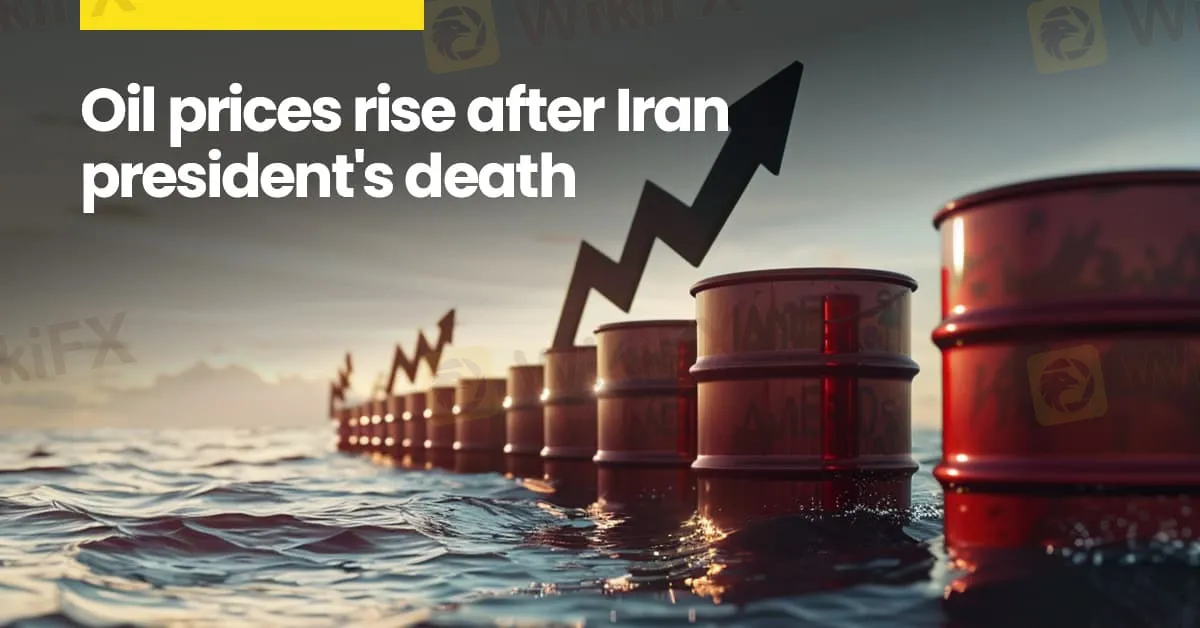简体中文
繁體中文
English
Pусский
日本語
ภาษาไทย
Tiếng Việt
Bahasa Indonesia
Español
हिन्दी
Filippiiniläinen
Français
Deutsch
Português
Türkçe
한국어
العربية
Oil Prices rise after Iran president’s death
Abstract:According to the report, oil prices surged during early Asian trading on Monday, building upon last week's upward momentum. This uptick was driven by multiple factors, including the unfolding search for Iran's president after a helicopter crash in the oil-rich nation and the United States' decision to purchase crude to bolster its national reserves.

According to the report, oil prices surged during early Asian trading on Monday, building upon last week's upward momentum. This uptick was driven by multiple factors, including the unfolding search for Iran's president after a helicopter crash in the oil-rich nation and the United States' decision to purchase crude to bolster its national reserves.
As of 0049 GMT, Brent crude had risen by 26 cents, representing a 0.3 percent increase, reaching $84.24 per barrel. Similarly, U.S. West Texas Intermediate (WTI) crude saw a gain of 15 cents, or 0.2 percent, reaching $80.21 per barrel.
The previous week concluded with Brent crude experiencing a 1 percent uptick, marking its first weekly gain in three weeks. Meanwhile, WTI crude climbed by 2 percent, buoyed by positive economic indicators from both the U.S. and China, the world's largest consumers of oil.
The recent surge in crude oil prices has been underpinned by several factors. Firstly, a helicopter carrying Iranian President Ebrahim Raisi crashed on Sunday, raising concerns about the safety of high-profile figures in the region. Despite this development, the impact on oil prices remained relatively subdued. Additionally, market focus is shifting towards the upcoming meeting of the Organization of the Petroleum Exporting Countries (OPEC) and its allies on June 1, where discussions on output policy are expected to provide clarity to the market.
Warren Patterson, head of commodities strategy at ING, highlighted the current state of the oil market, stating, “The oil market remains largely rangebound, and without any fresh catalyst, we will likely have to wait for clarity around OPEC output policy to break out of this range. The market also appears increasingly numb to developments on the geopolitical front, likely due to the large amount of spare capacity OPEC is sitting on,” as quoted by Reuters.
Meanwhile, seizing the opportunity presented by the recent dip in oil prices, the U.S. government announced its purchase of 3.3 million barrels of oil at $79.38 per barrel to replenish its Strategic Petroleum Reserve, following a significant drawdown from the reserve in 2022.
Last week, market sentiment received a boost from indications of easing inflation in the U.S., which raised expectations of potential interest rate cuts. Such cuts could potentially weaken the dollar, thereby making oil more affordable for holders of other currencies.

Disclaimer:
The views in this article only represent the author's personal views, and do not constitute investment advice on this platform. This platform does not guarantee the accuracy, completeness and timeliness of the information in the article, and will not be liable for any loss caused by the use of or reliance on the information in the article.
Read more

Will natural disasters have an impact on the forex market?
The forex market is known for its rapid responses to global events, but the influence of natural disasters, such as earthquakes and typhoons, can be less straightforward. While headlines may scream about catastrophic damage and economic disruption, the long-term effects on currency values often depend on a blend of immediate shock and underlying economic fundamentals.

Philippines Deports 29 Indonesians Linked to Online Scam Syndicate in Manila
Online scam groups in the Philippines trick Filipinos into gambling and love scams, from Manila to Bacolod, causing trafficking and pain as police fight back.

Why does your mood hinder you from getting the maximum return from an investment?
Investment decisions are rarely made in a vacuum. Aside from the objective data and market trends, our emotions—and our overall mood—play a crucial role in shaping our financial outcomes. Whether you’re feeling overconfident after a win or anxious after a loss, these emotional states can skew your decision-making process, ultimately affecting your investment returns.

Top Currency Pairs to Watch for Profit This Week - March 31, 2025
Discover the top 5 currency pairs to trade for profit this week, March 31, 2025—USD/JPY, EUR/USD, GBP/USD, AUD/USD, USD/CHF—with simple strategies and best times.
WikiFX Broker
Latest News
How Crypto Trading Transforms FX and CFD Brokerage Industry
UK would not hesitate to retaliate against US tariffs - No 10 sources
FCA Warns Against 10 Unlicensed or Clone Firms
CySEC Warns Against 14 Unlicensed Investment Websites
Top Currency Pairs to Watch for Profit This Week - March 31, 2025
Will natural disasters have an impact on the forex market?
Philippines Deports 29 Indonesians Linked to Online Scam Syndicate in Manila
Navigating the Intersection of Forex Markets, AI Technology, and Fintech
Exposed: Deceptive World of Fake Trading Gurus – Don’t Get Fooled!
AI-Powered Strategies to Improve Profits in Forex Trading
Currency Calculator







